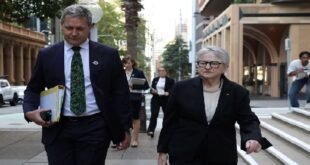13-11-2023
NEW YORK: This week marked the end of the most dramatic phase of Donald Trump’s New York business fraud trial, which saw high-profile members of his family make the journey to Lower Manhattan one by one to answer probing questions from prosecutors.
 On Monday Trump’s defence team will begin presenting their side, calling the former president’s oldest son back to the stand as their first witness but legal analysts told media that after two damaging weeks of testimony from members of the Trump family, salvaging their case now will be a herculean task.
On Monday Trump’s defence team will begin presenting their side, calling the former president’s oldest son back to the stand as their first witness but legal analysts told media that after two damaging weeks of testimony from members of the Trump family, salvaging their case now will be a herculean task.
“It’s been a disaster from a legal perspective,” said Neama Rahmani, a former federal prosecutor and president of West Coast Trial Lawyers.
He believes that Trump is “going to lose this case, and lose badly”.
In a worst-case scenario for Trump, Judge Arthur Engoron could bar him and his fellow defendants from doing business in New York, and issue fines of at least $250m (£204m) in penalties.
Perhaps the most harmful of all the testimony came from Trump himself. When he took the stand on Monday, he called New York Attorney General Letitia James a “political hack”, declared the case “a disgrace” and personally attacked Judge Engoron.
At several points, Judge Engoron demanded Trump’s lawyers rein in his behavior, and answer the questions posed to him. If they did not, the judge pledged to “draw every negative inference that I can”.
“If Donald Trump was anybody other than a person with Secret Service protection, he would have been jailed for contempt of court,” said Mitchell Epner, an attorney who handles commercial litigation.
 When he did directly respond to prosecutors’ questions, Trump did perhaps even more damage to his cause.
When he did directly respond to prosecutors’ questions, Trump did perhaps even more damage to his cause.
At the heart of the attorney general’s lawsuit are documents known as statements of financial condition, the balance sheets that the Trump Organization used to demonstrate the value of its properties and Trump’s net worth so they could obtain loans and insurance rates.
The attorney general’s office alleges those documents were fraudulently inflated to obtain deals they could not have received based on their true financials.
The judge had already ruled those documents were false. He is now weighing whether there was an intent to defraud, whether the defendants did so for personal gain, and other charges. The judge will also determine whether to issue penalties and if so, how severe.
On the stand, Trump boasted that his properties like Mar-a-Lago and 40 Wall Street were in fact worth more than their value on paper, but acknowledged he believed at least one of his properties may have been overvalued.
At another point, a prosecutor questioned him about the size of his Trump Tower penthouse, which the company had claimed was over 30,000sq ft, but really took up just over 10,000. Trump first acknowledged he had believed the claimed square footage was “high” but then began to throw around larger estimates of its size. (Int’l Monitoring Desk)
 Pressmediaofindia
Pressmediaofindia




